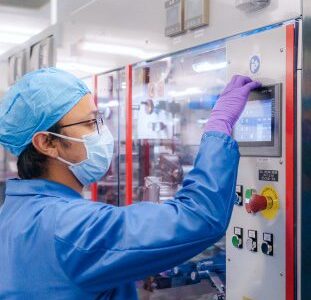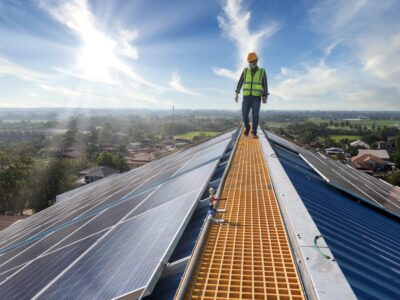Scientific discussions about climate change and carbon dioxide (CO2) emissions often veer into complex scientific jargon, which is why some organizations break things down into terms most people can understand. For example, NASA estimates that the average car in the U.S. will produce 1 metric ton of CO2 over three months.
Separate research from Nature.com found that 1 million metric tons are roughly equivalent to the “average annual emissions of 35 commercial airliners, 216,000 passenger vehicles, and 115,000 homes in the United States.”

Based on those calculations, it’s easy to see that removing up to 2 million metric tons of CO2 emissions per year could be a real game-changer. That’s the goal of a partnership formed last year between oil and gas giant ExxonMobil and leading fertilizer maker CF Industries Holdings.
Under the terms of the partnership, Exxon Mobil has agreed to help capture and store as much as 2 million tons a year of CO2 emissions that CF Industries produces at its facility in Donaldsonville, LA. The project is scheduled to start in early 2025 and supports Louisiana’s objective of net-zero emissions by 2050.
The deal will enable CF to produce and market as much as 1.7 million tons of “blue ammonia” per year.
As noted in an October 2022 press release, “blue” chemical processes allow CO2 emissions to be captured before being released into the air, which assists in carbon neutrality.

Blue ammonia’s components — nitrogen and hydrogen — are used in fertilizer production only without emitting any carbon when combusted. As a result, blue ammonia is in heavy demand as a decarbonized energy source for hard-to-abate industries.
CF Industries will invest $200 million to build a CO2 dehydration and compression unit at its Donaldsonville plant that will enable the captured gas to be transported and buried. Exxon will then transport and permanently store it in secure geologic storage facilities it owns in Louisiana’s Vermilion Parish.
“This agreement also ensures that we remain at the forefront of the developing clean energy economy,” said Tony Will, CF Industries CEO, in a statement. “As we leverage proven carbon capture and sequestration technology, CF Industries will be first-to-market with a significant volume of blue ammonia. This will enable us to supply this low-carbon energy source to hard-to-abate industries that increasingly view it as critical to their own decarbonization goals.”

ExxonMobil also signed a deal with EnLink Midstream to use its network to transport the 2 million metric tons of captured CO2 for storage — equal to swapping about 700,000 gasoline-powered cars for electric cars.
The CF partnership also builds on Exxon’s broader initiative to lower its carbon footprint. The Irving, TX-based company has faced calls from investors and other stakeholders to reduce its carbon emissions from both petroleum sales and operations. In 2020, it reported at least 650 million tonnes of emissions from petroleum sales and 112 tonnes from operations, the Washington Post reported, citing data from the Securities and Exchange Commission.
In early 2022, Exxon announced a program to achieve net-zero greenhouse gas emissions by 2050 on the operations side, though the program does not address emissions from petroleum sales.
Exxon has committed to investing more than $15 billion by 2027 in lower-emission initiatives as part of the plan. The CF partnership will help Exxon take a major step toward its carbon reduction goals.

Dan Ammann, president of ExxonMobil Low Carbon Solutions, called the partnership a “landmark project” representing “large-scale, real-world progress” to decarbonize the global economy.
“ExxonMobil is providing a critical and scalable solution to reduce CO2 emissions, and we’re ready to offer the same service to other large industrial customers in the state of Louisiana and around the world,” Ammann said in a press release. “We’re encouraged by the momentum we see building for projects of this kind, thanks to supportive policies such as the Inflation Reduction Act.”





